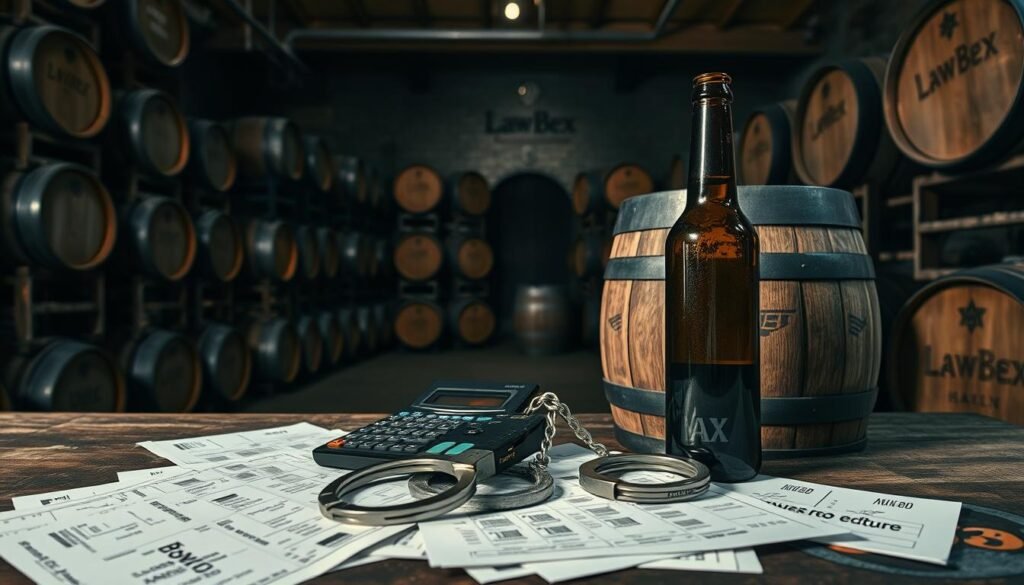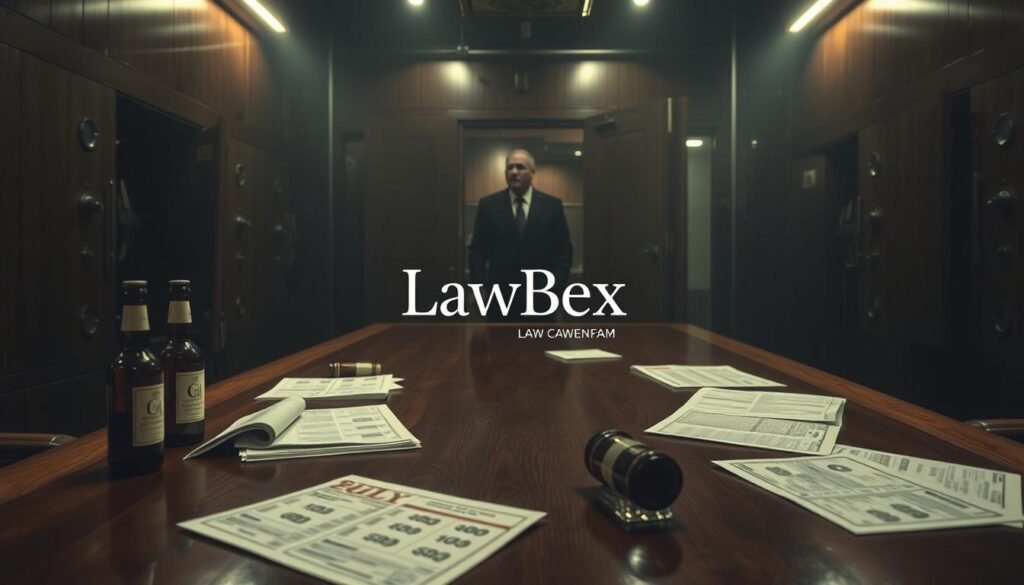A fraud case in Albi has put a local brewery in the spotlight. The business was found guilty of significant tax fraud, leading to a major investigation. This article dives into the details, covering the key players, legal actions, and the impact on the local economy.
Could this big fraud case be just the start of uncovering more financial wrongdoings in the brewing world? As we dig into the scandal, we start to think: how common is tax evasion and embezzlement in beer making and selling?
Key Takeaways
- A brewery in Albi, France, has been convicted of a major tax fraud case.
- The investigation process and legal proceedings shed light on the complexities of financial crimes in the brewing industry.
- The case raises questions about the prevalence of tax evasion and embezzlement in the beer production and distribution sectors.
- The broader implications for the local economy and public perception of corporate responsibility are explored.
- Lessons learned from this case can inform efforts to strengthen compliance and ethical practices in the industry.
The Brewing Industry and Financial Compliance
The brewing industry is a growing sector with strict financial rules. It’s crucial for breweries to be transparent and accountable. This ensures they follow the law and keep the public’s trust. We’ll look at the legal duties breweries have and the risks of financial crimes like tax fraud.
Importance of Transparency and Accountability
Transparency and accountability are key for breweries. They must accurately report their finances to the government. This openness helps build trust with customers, investors, and the community.
If breweries don’t follow these rules, they face serious legal and reputation problems.
Legal Obligations and Consequences
Breweries must follow many financial laws. This includes reporting income, taxes, and other financial dealings correctly. If they don’t, they could face big fines, lawsuits, and even criminal charges.
The industry must focus on financial compliance to avoid these issues. This includes avoiding financial crimes like tax fraud.
| Compliance Requirement | Potential Consequences of Non-Compliance |
|---|---|
| Accurate reporting of income and taxes | Fines, legal action, and criminal charges for tax evasion |
| Transparent financial record-keeping | Loss of public trust, reputational damage, and regulatory scrutiny |
| Adherence to industry-specific regulations | Revocation of operating licenses and business disruptions |
By following financial rules, breweries can keep stakeholders’ trust. This helps the industry’s overall integrity.
Uncovering the Fraud Case in Albi
The fraud case in Albi was uncovered through a detailed investigation. It showed big financial problems at the local brewery. The authorities looked closely at the brewery’s records and deals, making sure they found everything.
The investigation started with a tip from a whistleblower. They were worried about strange things happening in the brewery’s accounting department. The investigators used their skills and tools to check the brewery’s financial papers, invoices, and bank records.
As they dug deeper, they found a lot of fraud. This included inflated expenses, fake invoices, and money being moved around. The team worked hard to find out how big the financial problems were, leaving no stone unturned.
By using special accounting methods and talking to important people, they uncovered a big lie. The truth was shocking. It showed a plan to cheat the government and make the brewery’s owners richer, using taxpayer money.
This detailed investigation was the start of the legal actions that followed. It set the stage for the big fraud case in Albi. It caught the eye of the local community and people all over.

Key Players and Entities Involved
The fraud case in Albi has shown a complex web of key players and entities. Each part plays a big role in understanding the fraud and finding the truth. This includes the ownership and management of the brewery.
The Brewery’s Ownership and Management
The Tarn brewery is owned by a group of investors. They control the company’s money decisions. The management team, led by the CEO and CFO, runs the brewery’s daily operations.
But, there are claims of financial mismanagement and tax evasion. This has raised questions about conflicts of interest and lack of accountability. It’s important to look into the actions of these key players to understand the fraud fully.
| Key Players | Entities Involved |
|---|---|
|
|
The investigation into the Tarn brewery’s finances is ongoing. The roles and actions of these players and entities will be closely examined. Knowing their involvement is key to figuring out the fraud’s extent and holding those responsible accountable.
Financial Crime and Tax Evasion Allegations
At the center of the Albi fraud case are serious charges of financial crime and tax evasion. Authorities found a complex web of fraud by the Tarn brewery’s leaders. This brewery was once a key part of the local community.
The investigation shows the brewery’s management underreported income and used tax loopholes to pay less in taxes. The financial crime and tax evasion claims point to a plan to hide the business’s real financial state. They allegedly took money for personal use.
The fraud allegations go beyond just taxes. The company is accused of schemes to look financially better than it was. This includes making up revenue, changing inventory records, and fake invoices for loans and subsidies.
- Underreporting of income to evade taxes
- Exploiting loopholes in the tax code for illegal tax reduction
- Inflating revenue figures and manipulating financial records
- Falsifying invoices and documents to secure loans and subsidies
“The scale and sophistication of the alleged financial crimes at the Tarn brewery are truly staggering. It appears that the brewery’s leadership was willing to go to great lengths to line their own pockets, with complete disregard for the law and the trust placed in them by the community.”
The investigation is ongoing, revealing more about the financial crimes and their effects on the local economy and taxpayers. This case highlights the need for transparency, accountability, and ethical business practices in the brewing industry and beyond.

Fraud case in Albi: Evidence and Investigations
The fraud case in Albi was thoroughly investigated. This involved a detailed look at evidence and important information. The focus was on audit trails and financial documents, key to uncovering the fraud.
Audit Trails and Document Analysis
Experts carefully examined the brewery’s audit trails. They looked into financial transactions and accounting records. This effort revealed irregularities and suspicious activities, leading to fraud allegations.
- Detailed examination of the brewery’s accounting books and invoices
- Tracing the flow of funds and identifying unusual payment patterns
- Cross-referencing financial data with supporting documentation
- Identifying potential instances of tax evasion, misappropriation of funds, and other financial crimes
The team also looked into the brewery’s financial controls and practices. This detailed approach helped them understand the fraud case in Albi.
“The investigation uncovered a web of financial irregularities that pointed to a deliberate and systematic effort to defraud the government and enrich those at the top of the brewery’s management.”
As the investigation went on, the evidence from audit trails and documents was crucial. It helped set the stage for legal actions against those involved in the fraud in Albi.
Legal Proceedings and Court Hearings
The Albi fraud case led to legal action. Tarn, the brewery, faced tax fraud charges. The case went to court for several hearings.
The local authorities filed criminal charges against Tarn. This led to a series of court hearings. The community watched closely, as the case affected the local economy and trust in brewing.
- Timeline of the Legal Proceedings
- Courtroom Testimonies and Evidence Presentation
- Rulings and Judicial Decisions
- Appeals and Further Legal Challenges
- Sentencing and Penalties
Many witnesses testified in court, including former employees and financial experts. The evidence, like audit trails and financial records, was key. It aimed to show the extent of the legal proceedings, court hearings, and criminal charges.
“The legal proceedings were a pivotal moment in the Albi fraud case, as the court would ultimately determine the fate of the brewery and the individuals involved.”
The court’s decisions had big implications for Tarn and the brewing industry. The case showed the need for strong financial controls and transparent practices. It also stressed the importance of corporate responsibility.

Witness Testimony and Expert Opinions
During the trial, the court listened to many witnesses and sought advice from industry experts. Their statements and opinions were crucial in understanding the Tarn brewery’s tax fraud case.
Examining the Credibility of Statements
The court carefully checked the trustworthiness of what witnesses and experts said. They looked closely at the witness testimony and expert opinions to see if they were true and important to the case.
They considered several things when judging the credibility of these statements:
- Did the witness have firsthand knowledge or direct involvement?
- Was the witness or expert impartial and objective?
- Was there evidence that backed up what they said?
- Did their stories make sense and match up?
- Did the expert witnesses have the right qualifications and experience?
By carefully looking at the credibility of statements, the court wanted to get a clear picture of the financial issues and tax evasion at the Tarn brewery.
“The testimony provided by the former employees and the independent auditors was instrumental in uncovering the depth of the financial fraud at the Tarn brewery.”
Implications for the Local Economy
The Albi fraud case has hit the local economy hard. It’s not just the brewery that’s affected. The whole Tarn region’s business scene, jobs, and economic health have taken a hit.
The closure of the brewery has led to job losses. This affects not just brewery workers but also those in nearby service industries. The local economy has suffered as people spend less and tax revenue drops.
The business impact of the fraud is big. The loss of trust in local brewing makes it hard for other businesses to stay afloat. It’s tough to attract new investments. This has hurt the community effects as the region tries to bounce back.
| Impact | Tarn Region | National Level |
|---|---|---|
| Job Losses | 450 direct and indirect jobs lost | Increased unemployment rates in the brewing industry |
| Tax Revenue Decline | Estimated 8% decrease in local tax revenues | Decreased tax contributions from the brewing industry |
| Economic Growth | Projected 2.5% decline in regional GDP | Slowed economic growth in the brewing sector |
The local economy is facing big challenges because of the Albi fraud. The community is still dealing with the fallout. To move forward, rebuilding trust, drawing in new investments, and supporting local businesses are key. This will help the region recover and thrive in the long run.

White-Collar Crime and Public Perception
The fraud case in Albi involving Tarn brewery has highlighted white-collar crime’s impact. It shows how corporate misconduct can affect trust in businesses. This is true even if the financial details seem complex to some.
Rebuilding Trust and Corporate Responsibility
The Tarn fraud case shows we must focus on rebuilding trust. Businesses, especially in brewing, need to take steps to [https://www.justice.gov/sites/default/files/ag/legacy/2011/08/23/09-18-1985.pdf]show they care about corporate responsibility.
- Fostering transparency and accountability in financial reporting
- Implementing robust compliance programs and ethical training for employees
- Actively engaging with the community to address concerns and rebuild relationships
- Prioritizing environmental sustainability and social responsibility within the business model
By doing these things, companies can start to regain the public’s trust. This helps the brewing industry look more ethical. It also helps fix the damage from white-collar crimes like the one in Albi.
“Rebuilding trust is not just a public relations exercise – it’s a fundamental aspect of corporate responsibility that can have a lasting impact on a business’s success and reputation.”
As Tarn’s legal case goes on, the industry must stay alert and act. We need to tackle the reasons behind white-collar crime. This way, we can work towards a future where businesses are transparent, accountable, and care about their communities.
Legal Consequences and Sentencing
The Tarn brewery was found guilty of tax fraud. This has led to severe penalties. The court’s decisions aim to punish the brewery and prevent similar crimes in the future.
The brewery’s leaders were ordered to pay over $2 million in fines. They also face a five-year probation. During this time, they must follow strict financial rules and undergo audits.
- The former chief financial officer was sentenced to 18 months in prison. This shows the personal costs of fraud.
- Two senior managers got suspended sentences and community service. This shows the court’s commitment to justice for all.
- The brewery can’t get government funding or contracts for three years. This limits their ability to recover.
These penalties are a warning to the brewing industry. They highlight the need for honesty and following tax laws. The Tarn brewery’s case sets a precedent, showing the severe consequences of financial crimes.
| Legal Consequence | Details |
|---|---|
| Fines | $2 million in restitution to the government |
| Probation | 5-year probationary period with strict financial reporting requirements and regular audits |
| Prison Sentence | 18 months for the former chief financial officer |
| Suspended Sentences | 2 senior managers received suspended sentences and community service orders |
| Government Contract Ban | 3-year prohibition from participating in government-funded programs or contracts |
The Tarn brewery’s case is a lesson in financial compliance and ethics. The court’s decisions are clear: tax fraud and financial crimes won’t be tolerated. Businesses must be transparent and accountable.
Lessons Learned and Industry Reform
The Albi fraud case is a warning for the brewing industry. It shows the need for better financial checks and ethical business ways. Looking into this case, we see chances for big changes in the industry. These changes can stop similar problems and bring back trust from the public.
Strengthening Compliance and Ethical Practices
The Albi case teaches us about the value of strong compliance and ethics. Breweries need to check their controls, audits, and money reports. This ensures they are open and answerable. By having strict rules, the industry can avoid tax cheating, fraud, and other crimes that harm its reputation.
Also, it’s key to build a culture of doing the right thing. Breweries should train their workers, protect whistleblowers, and have clear rules against wrong actions. This way, the industry can gain back trust and make people believe in it again.
- Enhance internal controls and auditing procedures
- Implement transparent financial reporting systems
- Provide comprehensive employee training on compliance and ethics
- Establish robust whistleblower protections
- Develop clear policies that promote ethical business practices
The Albi fraud case shows the brewing industry must focus on compliance and ethics. By improving these areas, breweries can regain trust, reduce legal problems, and create a better future.
Embezzlement Investigation: A Cautionary Tale
The fraud case in Albi shows the dangers of financial crimes in the brewing industry. This story highlights the need for careful financial checks and the risks of ignoring signs of trouble.
The Tarn brewery, once a local hero, was found guilty of tax fraud. This scandal damaged the brewery’s reputation and made the whole industry wary. It shows how easily financial stability can be lost due to bad actions.
The Albi case shows how financial crimes can hurt businesses, communities, and the whole industry. By looking into the evidence and the people involved, we can learn important lessons. These lessons can help stop similar problems in the future.
“This case serves as a sobering reminder that no industry is immune to the threats of financial crime. It is our responsibility to learn from this experience and implement robust measures to safeguard the integrity of our businesses.”
This story calls us to take action. We must focus on being open, accountable, and ethical in the brewing industry. By fighting against embezzlement and other financial crimes, we can keep our businesses strong and successful.

Let this case be a warning to us all. It should make us improve our financial controls and auditing. By doing this, we can lower the risk of financial crimes and regain the trust of our customers and communities. This will help the brewing industry grow stronger and more secure for the future.
The Aftermath: Rebuilding and Moving Forward
The Tarn brewery’s tax fraud conviction in Albi has left the local community in a tough spot. The town is working hard to rebuild trust and make the industry better. This includes being more open and responsible.
Right after the conviction, the brewery’s leaders faced a lot of criticism. They knew they had to fix their reputation and win back people’s trust. This meant changing how they handle money and promising to act ethically.
To improve, the brewery teamed up with local officials. They started making big changes. These include:
- Creating strong checks and balances
- Teaching employees about tax laws and good financial habits
- Setting up an independent group to watch over the brewery
This situation has also made the whole industry think about being more responsible. Many breweries in the area have started to follow Tarn’s example. They’re making changes to make sure they’re following the rules and earning back people’s trust.
The Tarn brewery and local officials are focused on moving forward. They want to make sure the brewery is accountable and open. They aim to not just fix the brewery’s image but also set a good example for the whole industry. This way, they hope to prevent similar problems in the future.
| Key Initiatives for Rebuilding | Timeline | Status |
|---|---|---|
| Implementing robust internal controls and auditing procedures | 6 months | Completed |
| Providing extensive training for all employees on tax regulations and financial best practices | 1 year | Ongoing |
| Establishing an independent oversight board to monitor the brewery’s operations | 9 months | Completed |
“The aftermath of this case has been a wake-up call for our industry. We are committed to learning from our mistakes and paving the way for a more ethical and transparent future.”
– CEO, Tarn Brewery
Business owners of an iconic establishment in downtown Albi convicted of tax fraud
BUSINESS OWNERS OF AN ICONIC ESTABLISHMENT IN DOWNTOWN ALBI CONVICTED OF TAX FRAUD
Conclusion: Upholding Integrity in Business
The fraud case in Albi shows how important it is for businesses to be financially responsible. This includes the brewing industry. It’s clear that being transparent, accountable, and ethical is not just a choice. It’s a must for success and earning public trust.
Research on ethical leadership and integrity teaches us a lot. It shows that a culture of integrity can make a big difference. When leaders are seen as honest, it encourages everyone to act ethically and manage money wisely. This protects the business and its reputation.
We all have a role to play in learning from the Albi fraud case. We must aim to be financially responsible, transparent, and socially responsible. By doing so, we set a good example for others. Only by focusing on integrity can we regain public trust and keep our industries strong for the future.
